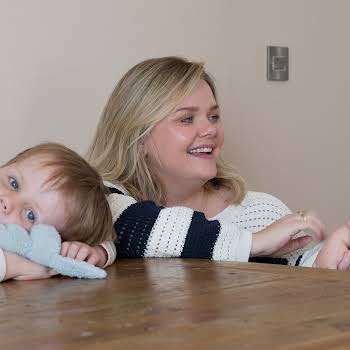The power of pessimism: why you should lower your expectations
By Nathalie Marquez Courtney
09th Aug 2024
09th Aug 2024
Rather than berating herself for not being able to look on the bright side, Nathalie Marquez Courtney discovers the surprising benefits of seeing the glass half empty.
My lessons in pessimism came from the most unexpected of places: my happy-go-lucky three-and-a-half-year-old son. The kid who gets excited about a lap around the block on his scooter, who squeals with glee at an orange juice ice pop and who giggles at fake farts has also made me deal with some uncomfortable personal truths about how I think the world works.
In general, I like to look on the bright side and had long believed in the importance of a positive outlook. My sunny disposition fell apart quicker than my kiddo’s tear-soaked tissues, though, when I realised that it wasn’t always that helpful to act as if everything was going to work out each time, every time.
Like many a parent before me, I caught myself trying to temper his excitement at every turn. Yes, we do hope your friend is in class today – but maybe she won’t be. For sure, we want to go look for hermit crabs at the beach at the weekend – but it might rain. Yep, we can go outside to see if there are kids playing – but perhaps there’ll be no one there.
Advertisement
THE POWER OF PESSIMISM
In my quest to figure out why I was quickly transforming from a Positive Pollyanna to a Negative Nancy, I turned to stoic philosopher Seneca (What? Like you don’t consult first century philosophers for all your parenting conundrums?). In truth, I came across Seneca’s work through the teachings of a more contemporaneous philosopher, The School of Life’s Alain de Botton. In a 2013 speech – which has racked up well over a million views on YouTube – he argues that we should aim to start anything with the assumption that things won’t turn out well, and that the right type of pessimism can in fact offer us a gentler and kinder way to move through the world. “It’s our expectations that define what will anger us,” de Botton says (anyone who has had to carry a crying, crestfallen toddler away from a closed-up ice cream van will know all too well how true that is). de Botton talks about the wisdom and beauty in thinking of life “as a deeply troubled and compromised affair.”
A society that tells people that they can achieve anything will also be a society that very swiftly develops a problem with self-esteem.
“Pessimism is a feature of life,” Alain de Botton asserts. “It’s a feature of life we often try to run away from. By running away from it too quickly, we cut ourselves off from the opportunity to embrace this darkness and to embrace the lessons that it often brings.” This got me thinking.
EXPECTATION MANAGEMENT
I realised that I wasn’t, in fact, unwittingly creating a culture of negativity in my son’s life but instead, trying to walk the ever-so-delicate expectation management high wire. It is becoming evident that having unrealistically high expectations can be dangerously toxic. “A society that tells people that they can achieve anything will also be a society that very swiftly develops a problem with self-esteem. If everybody expects to achieve everything, you’re going to get an awful lot of people who are feeling that something’s gone dramatically wrong with their lives,” says de Botton.
Advertisement
Here is where unbridled optimism can get you in trouble, and leave you in dire need of an expectations vs reality check. A study in the Journal of Personality and Social Psychology found that married couples who were extremely optimistic about their relationship’s future were more likely to experience relationship deterioration, while another, in the Journal of Experimental Social Psychology showed that positive fantasies about idealised futures actually sapped energy, and became a predictor of poor achievement.
QUITTING THE GLAD GAME
So how can you tell if you need to take on a more glass-half-empty approach? “The first step to knowing whether lowering your expectations is a wise move is to take a good look at where your expectations are currently residing,” says writer, events planner, and certified life coach Aoife McElwain.
“For me, being a people-pleasing perfectionist meant that, for years, my expectations were outlandish. I had to be The Best daughter, The Best sister, The Best wife, The Best friend, The Best blah blah blah. It was utterly exhausting and ultimately led to me being blisteringly burnt out by the age of 30. I’ve spent the last decade, through therapy and self-care, trying to unlearn the behaviours that keep me in the toxic cycle of unrealistic expectations.”
“I think lowering our expectations is very different from pessimism and, in fact, can help us lead more positive lives,” she continues. “If you are working with yourself instead of against yourself in the tasks you set for yourself in a day, a week, a year, and make decisions based on the information your head, heart and gut are giving you, these factors can hopefully lead to more and more positive experiences in your life, which I believe builds confidence and can help us step into a more real and true version of ourselves and therefore our lives.”
Being a people-pleasing perfectionist was utterly exhausting and ultimately led to me being blisteringly burnt out by the age of 30.
Advertisement
HURRAH FOR THE NAYSAYERS
Stepping into the “real and true” versions of ourselves is key to authentic parenting, and that often means taking the bad with the good. For Montessori teacher Simone Davies, author of the bestselling The Montessori Toddler (Workman Publishing, around €13), many parents struggle with simply sitting with negative emotions. “There is this definite resistance as caregivers to want to not say the thing that is bad, not say, “You are unhappy about this,” and that’s something parents have to work on themselves to try and grapple with before they can teach it to a young child.” Alain de Botton also argued that remaining stubbornly positive when the reality is far from it can lead to cutting ourselves off from the “deepest kind of relationships which we can have with other human beings, relationships based around a confession of suffering” and this too is something Davies has found to be true in both parenting and life. “I can’t even remember what had gone wrong, but I was walking my dog in the neighbourhood and I saw one of my dog-walking friends,” she recalls. I’m usually very positive, but when she said, “How are you?” I replied, “I don’t know. I’ve just had a really hard day.” And she just gave me this big bear hug, and it really was the right thing at the right time.”
“We have this idea that kids are meant to always be happy,” she continues. “But we want them to learn about dealing with everything that life throws at you – sometimes you’re happy and sometimes you’re sad. But we’re here to hold space for you no matter what you’re going through.” And with that, I’m off to break the news that we’re out of jam for this morning’s toast serving. Wish me luck…
This article originally appeared in the Summer 2023 issue of IMAGE Magazine.























